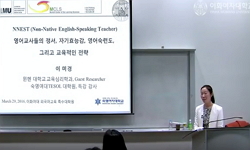This study investigates the effect of police officers’ self-efficacy on job burnout and examines whether anger regulation moderates this relationship. A structured survey was conducted among police officers in the Seoul and Gyeonggi regions, and the...
http://chineseinput.net/에서 pinyin(병음)방식으로 중국어를 변환할 수 있습니다.
변환된 중국어를 복사하여 사용하시면 됩니다.
- 中文 을 입력하시려면 zhongwen을 입력하시고 space를누르시면됩니다.
- 北京 을 입력하시려면 beijing을 입력하시고 space를 누르시면 됩니다.
https://www.riss.kr/link?id=A109679419
- 저자
- 발행기관
- 학술지명
- 권호사항
-
발행연도
2025
-
작성언어
-
-
주제어
경찰공무원 ; 자기효능감 ; 직무소진 ; 분노조절능력 ; 조절효과 ; Police officers ; Self-efficacy ; Job burnout ; Anger regulation ; Moderation effect
-
KDC
300
-
등재정보
KCI등재
-
자료형태
학술저널
-
수록면
59-71(13쪽)
- 제공처
-
0
상세조회 -
0
다운로드
부가정보
다국어 초록 (Multilingual Abstract)
This study investigates the effect of police officers’ self-efficacy on job burnout and examines whether anger regulation moderates this relationship. A structured survey was conducted among police officers in the Seoul and Gyeonggi regions, and the collected data were analyzed using descriptive statistics, exploratory factor analysis, correlation analysis, multiple regression, and moderation analysis. The findings indicate, first, that self-efficacy has a significant negative effect on job burnout, implying that officers with high self-efficacy experience lower levels of emotional exhaustion and reduced personal accomplishment. Second, anger regulation also shows a negative effect on job burnout, suggesting that those with high emotional control experience less burnout. Third, the moderation effect of anger regulation between self-efficacy and burnout is statistically significant. The buffering effect of self-efficacy on job burnout becomes stronger as anger regulation increases. These results suggest that self-efficacy and anger regulation serve as critical psychological resources in reducing police officers’ job burnout. The findings provide policy implications for enhancing psychological capital and designing effective human resource management strategies in police organizations.
동일학술지(권/호) 다른 논문
-
- 대구과학대학교 국방안보연구소
- 박숙경(Sook Kyoung Park)
- 2025
- KCI등재
-
관광기념품(굿즈)의 선택속성, 회상, 태도, 그리고 행동의도 간 구조적 영향관계 분석
- 대구과학대학교 국방안보연구소
- 홍민정(Min Jung Hong)
- 2025
- KCI등재
-
자치경찰제도의 협력적 거버넌스 형성요인과 성과에 관한 실증연구
- 대구과학대학교 국방안보연구소
- 장인봉(In Bong Jang)
- 2025
- KCI등재
-
장애인체육 주요 정책 및 관련 기사의 토픽 이슈 비교 분석 : 토픽모델링의 적용
- 대구과학대학교 국방안보연구소
- 홍석만(Suk Man Hong)
- 2025
- KCI등재





 스콜라
스콜라



